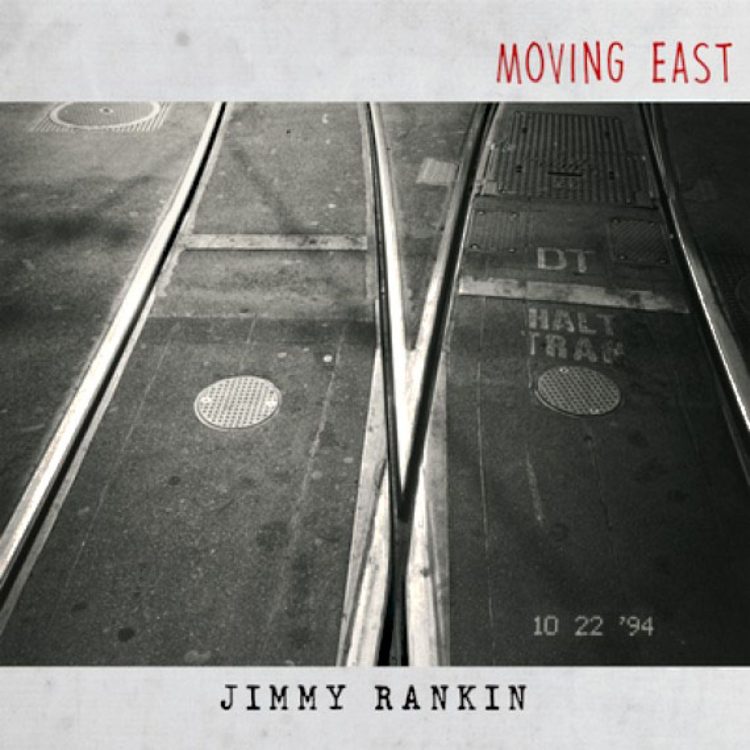
Music and the unique heritage and culture of Canada’s east coast has infused the creative output of Jimmy Rankin for the entirety of his life. First as a member of the internationally renown Rankin Family, and later as an in-demand songwriter and solo artist, the native of Mabou, Nova Scotia has always injected some aspects of his artistic roots into everything he has ever done.
But for his seventh solo album, the recently released Moving East (True North Records), Rankin decided to really take a deep dive into his Celtic roots, and the sorts of songs and stories that have been a part of his life, and those of his ancestors, for many generations. The multi-time Juno and ECMA award winner has penned and recorded a collection of songs that are a love letter to his upbringing, and a joyful celebration of the emotional and spiritual touchstones that always tugged at his heartstrings when he was away from home, and which eventually brought him back to the beautifully rugged, salt-sprayed shores of Cape Breton.
“We moved to Nashville around 2010 and it was basically for a change of scenery and a change of weather, and really a change of life. I had been going to Nashville since the mid-1990s to make records and write as a member of the Rankin Family and also as a solo artist. So, I knew Nashville and I knew people there. We ended up staying a lot longer than we intended to. We didn’t intend to stay for nearly eight years, but time just flew by. We were very busy working and we got dug in very well there,” said Rankin, shortly before embarking on his current cross-Canada tour.
“But I never intended to stay, and we always have kept a place in Cape Breton. We lived most of our time in Halifax when we lived in Nova Scotia, but we had that place in Cape Breton, so we would come back for summers, Christmas and other holidays. We were just at a time when we had to make a decision, because our kids were getting older and we didn’t want to uproot them too late in their schooling years. We had to make a decision to come and we did come back about two years ago.
“Upon my return, I had been thinking about making this record as a return to my roots as a writer, something to get back to the music and the stories that inspired me as I was growing up and learning how to play music, and also learning how to write songs here. I was writing about things I knew about and stories I’d heard and the music that inspired me. And those songs wound up on Rankin Family records and eventually on my own records.”
To help him bring his vision and ambition to life, Rankin couldn’t have picked a better collaborator to act as producer for the album that another iconic Nova Scotia artist – singer/songwriter/producer Joel Plaskett.
“He’s got his studio in Dartmouth, and Joel is also a songwriter and producer and travelling musician, so it was really a good fit because I wanted to work with someone who understood where I was coming from and who also understood roots music and Celtic music. Joel was a great fit and I played him the songs and he understood what I was going for; he got it. Originally, I wanted to make a really acoustic folk record but of course Joel’s a rock and roller and drums got added and it became an east coast folk rock record. I am very pleased with it, it’s very organic – a lot of it is very live off the floor,” he explained, adding that he made sure every aspect of the album lived and breathed the east coast vibe, from the artwork by friend and artist, the recently deceased Robert Frank, to many of the backing and special guest musicians who performed on Moving East.
“Collaboration is a big part of the music here, and I think that runs deep in the way people learn to play music here. The kitchen party has become a cliched term, but people do tend to jam a lot here, whether it’s Celtic music or other songs. There are so many genres of music and different musicians here, which is really wonderful. And everybody tends to either know of somebody or knows them, and the circles seem to be quite small,” he said.
Guests including New Brunswick blues guitar master JP Cormier, the aforementioned legendary fiddle sensation Ashley MacIsaac and traditional Cape Breton pianist Hilda Chiasson.
The Rankin Family were on the forefront on a huge wave of popularity that traditional east coast music rode throughout the 1990s, alongside the likes of Ashley MacIsaac and Natalie MacMaster among others. While that wave has lessened somewhat, the residual popularity of music from the various regions comprising Canada’s maritime provinces remains unabated. It is also remarkably popular outside of the borders of traditionally Celtic regions.

“Music is really part of the fabric of life here and it’s just ingrained in people. We have great songwriters and great storytellers here. Songs and singing are very much part of the culture here. It’s the way we grow up. I was fortunate enough back in the 1990s to be part of that wave with the Rankin Family when the rest of the world discovered the east coast of Canada. We’ve always had a lot of music here and art, but for some reason at that time, it became this worldwide phenomenon,” he said.
“I think for the people here, it’s just part of who we are, and its infectious, and I think that translates to other parts of the world. People play with soul here, and the Celtic music has traveled around the world. Cape Breton fiddle music is a genre in itself now. It’s part of the fabric that people discover. Storytelling is very much a part of the way I was raised where in the community there is always some story about what happened last night, or what happened 50 years ago, or 100 years ago.
“It’s history, really, and I think we are naturally storytellers because of our culture, and I think a lot of other cultures in the world have that storytelling tradition as well. I am sure in Scandinavia it’s pretty much the same, or in Germany. I am sure if you dig deep enough, there is a history of storytelling in most cultures, and sometimes it surfaces in novels, or songs, or visual arts or film.”
One of the most delightfully homespun of the tales on Moving East is the sweetly nostalgic The Rawleigh Man.
“Rawleigh Products were invented by William Thomas Rawleigh and he was from the midwestern United States, a farm boy who was into liniments and lotions and ointments. His ad read that they were ‘good for man and beast’. So, he travelled from farm to farm and sold them. Eventually he became very successful and sold the products around the world. Back when I was a kid, all these areas of New Brunswick, PEI, Cape Breton and probably all across Canada in the rural areas, they had Rawleigh salesmen. And there was this little old guy who used to drive around in his truck out here, for many years, and there was probably somebody before him. I recently saw a picture of an old Rawleigh wagon, and it brought back these memories of seeing this fella,” Rankin said.
“I remember this old Rawleigh salesman would come to our house and sell my parents liniment and ointment and stuff like that. I often wondered what happened to him because one day he just sort of disappeared. That’s sort of the ditty of the Rawleigh Man. I have sung that song across the country and I always ask people if they remember the Rawleigh Man. I get a pretty mixed demographic at my shows, so inevitably there’s always people that remember a Rawleigh Man. I remember even when I was in Toronto years ago seeing an old knife sharpener going around in his truck in the suburbs and neighbourhoods of Toronto. I like those traditions and those kinds of craftspeople.”
Haul Away the Whale is essentially an ode to the region in which Rankin grew up, Mabou, which is linked to many other communities along the northwest coast of Cape Breton Island by the picturesque Route 19.
“Route 19 goes down the west coast of the island. Natalie MacMaster is from that part of the world, so is Ashley MacIsaac and tons of other musicians. Haul Away the Whale is sort of a humorous sea shanty, and it’s based on all those little communities when you start at Port Hawkesbury and go down Route 19, eventually you end up on the other side of the island if you want to. I try to mention all those little places that I know so very well: I have driven that stretch thousands of times, and also walked and hitch-hiked it. So that’s what it’s really about, good old Route 19,” he said.
“I’ve always known it was an amazing place to live and to be from, and I’ve always sung about it and talked about it in my records and on my tours and in interviews. It’s always been a major part of what’s formed me as a person and as a musician. Of course, I have travelled extensively with music, and even just as a tourist throughout my life. I have seen a lot of the world and I like meeting people and going different places. But I have always wanted to come home. I don’t mind living in other places, and I have done that I my life, but I guess as you get older, you want to have kind of a place to go back to. Its something a lot of people don’t have, but I am very fortunate to have that. My relatives are there and many of my friends. Although we do go away for work or other reasons, we never forget where we’re from.”
Where Jimmy Rankin is at is on the road at present. The Moving East tour begins October with shows in Ingersoll, Gravenhurst, Elliot Lake, Sault Ste. Marie and Lindsay Ontario, before moving west to Saskatchewan, Alberta and B.C. next week, wrapping up at the Lunenburg Opera House on Nov. 1. Rankin then hits the Maritimes again for a five-stop Christmas tour, December 13 to 20, with three shows in New Brunswick and two in Nova Scotia.
For more information on tour dates, Moving East and any other news, visit http://jimmyrankin.com.
- Jim Barber is a veteran award-winning journalist and author based in Napanee, ON, who has been writing about music and musicians for a quarter of a century. Besides his journalistic endeavours, he now works as a communications and marketing specialist. Contact him at jimbarberwritingservices@gmail.com.
SHARE THIS POST:
